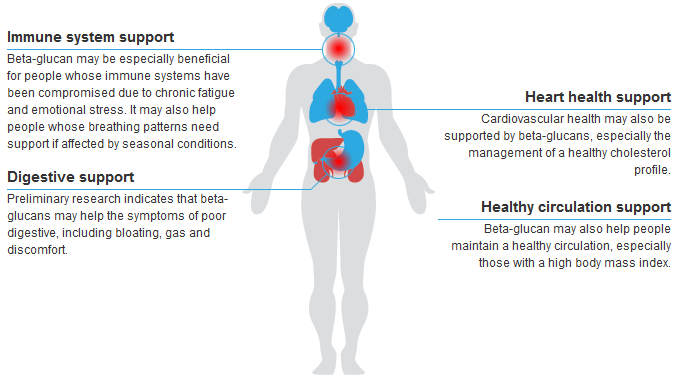Beta-glucan, a polysaccharide derived from sources like baker's yeast and cereal grains, acts as a biological response modifier by binding to immune cell receptors, stimulating immune function and offering potential benefits for immune support, especially during compromised states, while also showing promise in promoting heart health, healthy digestion, and circulation.
Beta-glucans are complex sugars known as polysaccharides. They are composed of simple sugars called D-glucose monomers that are linked together by beta-glycosidic bonds. The most chemically active form of beta-glucans is known more specifically as B-1,3/1,6 glucan.
The most common dietary source of beta-glucan is baker’s yeast, known scientifically as Saccharomyces cerevisiae. It is also found in the bran of grains such as barley and oats. Wheat and rye bran also contains beta-glucans, but at significantly lower levels. Beta-glucan is typically produced in commercial quantities by fermenting oat bran with baker’s yeast. Some types of mushrooms are also commercial sources of beta-glucan.
Beta-glucan is known as a biological response modifier due to its effect on the immune system. Some immune cells contain locations known as complement receptor 3 and dectin-1 receptors. These sites bind to beta-glucans, which can stimulate an immune response. Some researchers believe that the frequency, length and location of beta-glucan’s side chains are a more significant indicator of its immune system activity than the structure of the molecule’s backbone.
Some forms of beta-glucan are also a common ingredient in soluble fiber supplements and texturing agents. Other uses of beta-glucan include the diagnosis of fungal infections, especially species in the Agaricus and Aspergillus genera.
The most common use of beta-glucan is to support the immune system. Additional uses include heart health and support of the digestive system.
Beta-glucan may be especially beneficial for people whose immune systems have been compromised due to chronic fatigue and emotional stress. It may also help people whose breathing patterns need support if affected by seasonal conditions.
Preliminary research indicates that beta-glucans may help the symptoms of poor digestion, including bloating, gas, and discomfort.
Cardiovascular health may also be supported by beta-glucans, especially the management of a healthy cholesterol profile.
Beta-glucan may also help people maintain healthy circulation, especially those with a high body mass index.

A compromised immune system is the most common sign that you may need beta-glucan. A family history of cardiovascular conditions may also indicate that beta-glucan will be beneficial. Emotional and physical stress may also deplete your beta-glucan levels. That is why those with low natural levels of beta-glucan who require additional support tend to be athletes, and those with stressful lifestyles.
Beta Glucan, beta glucans
Shipping calculated at checkout
